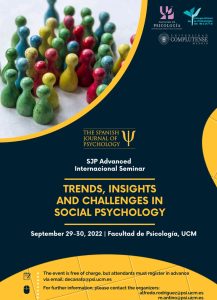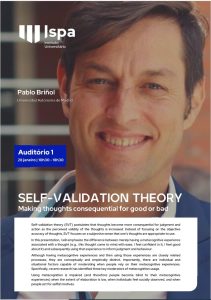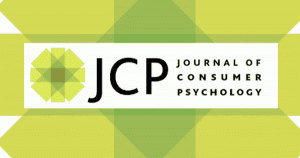Posts by Pablo Briñol
Trends, Insights and Challenges in Social Psychology
September 29-30, 2022 | Facultad de Psicología, UCM https://www.cambridge.org/core/journals/spanish-journal-of-psychology/latest-issue Thursday morning sessions Thursday evening sessions Friday morning sessions
Read MoreConcurso Oposición de Acceso al Cuerpo de Profesores Catedráticos de Universidad
Área de Conocimiento: Psicología Social Plaza: UAM-2022P687-CU
Read MoreSounding confident affects persuasion through multiple processes
Joshua J. Guyer https://www.spsp.org/news-center/blog/guyer-voice-confidence-persuasiveness Guyer, J. J., Briñol, P., Vaughan-Johnston, T. I., Fabrigar, L., Moreno, L., & Petty, R. E. (2021). Paralinguistic features communicated through voice can affect appraisals of confidence and evaluative judgments. Journal of Nonverbal Behavior. DOI: 10.1007/s10919-021-00374-2
Read MoreLisbon Meeting on Attitudes and Persuasion
Link to the Program Link to the Book of Abstracts
Read MoreMid-Career Award from the Attitudes and Social Influence Group of the Society of Personality and Social Psychology (SPSP)
https://www.uam.es/uam/noticia/pablo-brinol-premio-mid-career-spsp-2022
Read MoreRanking of the best Spanish researchers in Health Sciences (2021)
Ranked # 1 in Social Psychology. Based on the Science Citation Index Expanded (SCI-EXPANDED) and Social Sciences Citation Index (SSCI): Num. Pub Name h-index Fh Inicio Área 126 Briñol, Pablo 33 1,22 2000 Psychology, Social November, 2021 To link to the ranking.
Read MorePsychological Review
Self-validation theory (SVT) is introduced and presented as a series of six postulates. The core notion of SVT is that thoughts become more consequential for judgment and action as the perceived validity of the thoughts is increased. Instead of focusing on the objective accuracy ofthoughts, self-validation research focuses on a subjective sense that one’s thoughts…
Read MorePromoting Healthy Eating Practices through Persuasion Processes
The successful impact of healthy eating campaigns often depends on the extent to which messages are effective in changing attitudes and behaviors over time. The present work proposes that healthy eating campaigns can be designed taking into consideration elaboration and validation processes so that the degree of attitude change is maximally influenced and is consequential.…
Read MoreUnderstanding personalized matching effects in persuasion
One of the most reliable and impactful methods for enhancing a persuasive appeal is to match an aspect of the proposal (i.e., its content, source, or the setting in which it is delivered) to an aspect of the consumer receiving it. This personalized matching in persuasion (also called tailoring, targeting, customizing, or personalizing) comprises a…
Read MoreChanging prejudiced attitudes, promoting egalitarianism, and enhancing diversity through fundamental processes of persuasion
The thoughts people generate – their number and valence – are critical for understanding when responding to persuasive attempts will result in egalitarian attitudes. A focus on thinking highlights the importance of understanding short and long-term attitude change in promoting diversity. How much people think is also consequential for spreading of initial change to more…
Read More








